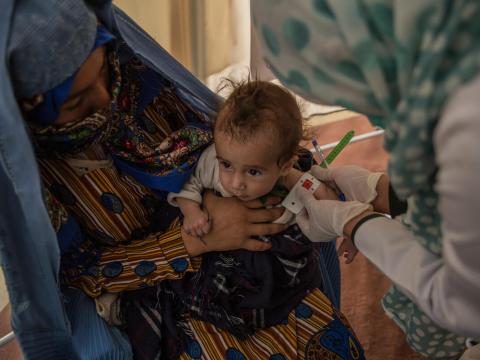A Mother’s Plight of Harsh Winter

Maldara and her family live in a massive camp for internally displaced people (IDPs), located just outside Herat, the third-largest city in western Afghanistan. Herat has hosted a large number of IDPs, some estimated the number to be about 800,000 people, who moved due to continuous drought, escalating conflict and severe economic decline.
On this day, Maldara is holding Ahmad, 1, in her arms while waiting for her turn to see the doctor. Ahmad is visibly malnourished and not feeling well. His eyes are sunken and he is crying a lot. “He has been having diarrhea and fever,” Maldara says, “I think it is because he has been eating what we are eating. We do not have money to buy baby food or milk for him,” she explains.

Maldara recalls the day when she and her family had to flee their home Moqhab three years ago. They were driven out by drought and conflict. “We did not have much to eat then, but we certainly do not have enough here either. Things were difficult in the camp in the beginning. But, for a year now my daughters have been sewing some things and selling them, which bring a little income. Unfortunately, they have to work day and night just to buy a kilo of flour and a litre of oil.”
Even though she already has five daughters and three sons of her own, Maldara decided to adopt Ahmad and his young sister when their mother died just 10 days after Ahmad was born. She is very concerned about the coming winter because she does not have enough to keep her children warm and well-fed. “If nobody helps us, we may not make it. This clinic is all help that we get and we are very glad, but it will be a great if we can get some flour, food, and clothes to prepare us for winter. We will be happy with any help that we can get,” she says.
World Vision has been working in Afghanistan since 2001 and has supported the operations of the clinic in this IDP camp since February 2021 in response to the deteriorating conditions which were bringing additional suffering to children and their families. Around 140 refugees come to the clinic daily, accessing services such as outpatient, nutrition, vaccination, midwifery, and health promotion. The clinic, and others like this one that World Vision operates, has seen a sharp increase in the number of people coming in because the formal health system within Afghanistan is on the brink of collapsing.

In the first three months since World Vision started its emergency response operations in Afghanistan in August 2021, the organization has provided nearly 9,000 people with life-saving health and nutrition services, almost half of them children under the age of five. In addition, World Vision partners with World Food Programme to provide food packages for more than 120,000 people to help them survive.
Learn more about our our programmes and our commitment to stay and deliver support to the most vulnerable in Afghanistan.